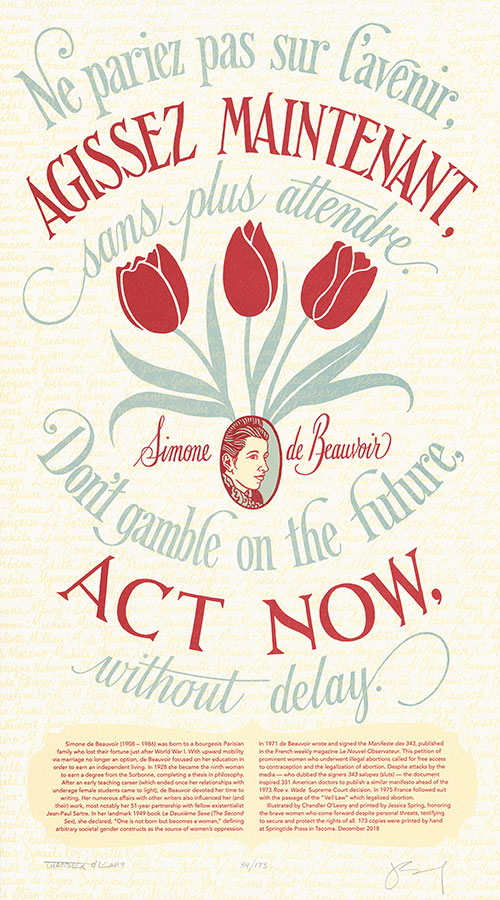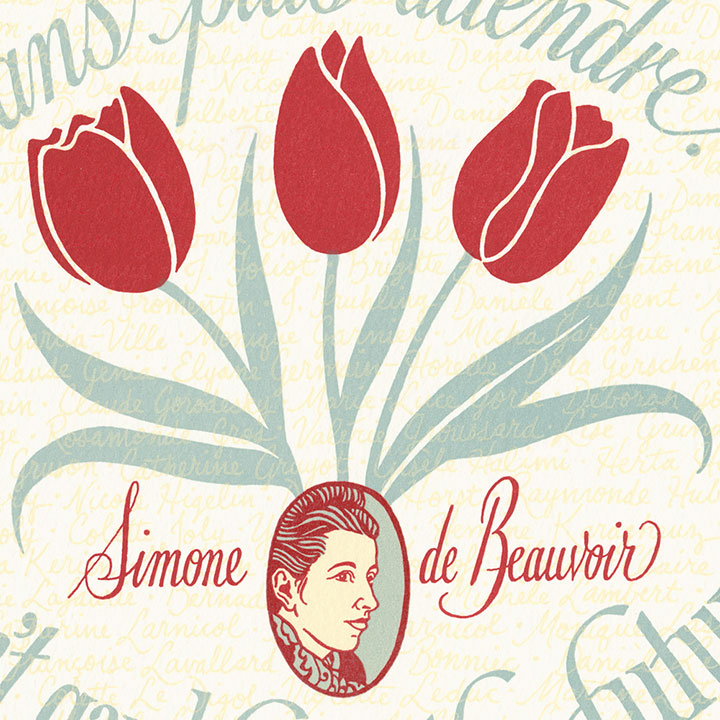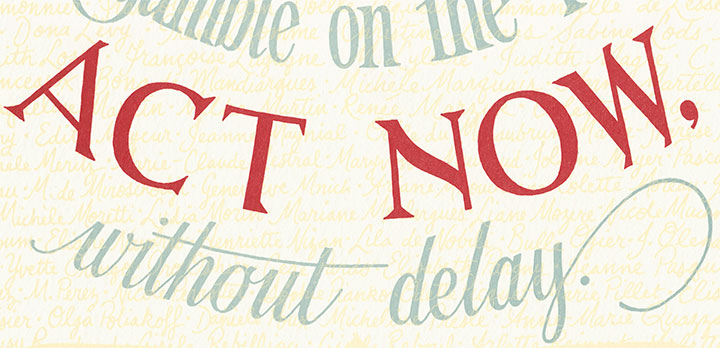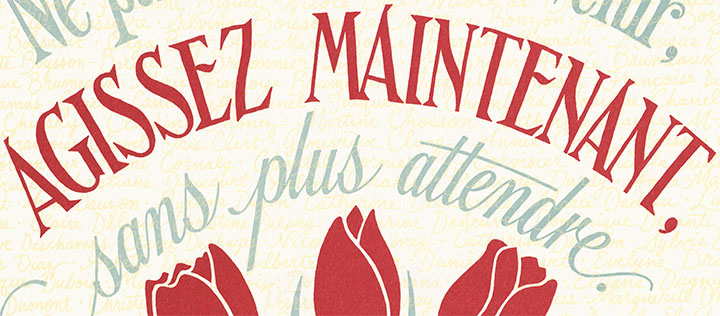This year we have been following current events with increasing dismay—lately it seems like women are embattled on every front. At the heart of every struggle are women telling their stories, testifying en masse to uncover and combat abuse, inequality, and the erosion of our civil rights. What is shocking is just how many women coming forward it takes for our testimonies to be taken seriously. Women have learned time and time again that we must band together, seeking justice in numbers. So for our newest Dead Feminists broadside, we turned to Simone de Beauvoir, who shepherded hundreds of women together to speak up for the rights of all:
Ne pariez pas sur l’avenir, agissez maintenant, sans plus attendre. (Don’t gamble on the future, act now, without delay.)
Simone de Beauvoir was a complex, controversial, even problematic figure all her life. Hesitant to call herself a philosopher, she nevertheless was an influential member of the French existentialist movement. Her many essays and books examined the very idea of self, particularly that of women in light of society’s expectations and constraints. She contended that women are as capable of choice as men, and that when women take responsibility for themselves and the world, they can choose their own freedom. Her tumultuous personal life, which made her as infamous as her writings, embodied this staunch belief in freedom of choice. Unwilling ever to marry or even set up a joint household with anyone, de Beauvoir maintained a 51-year partnership with Jean-Paul Sartre as well as numerous affairs with both men and women. Her insistence on intrapersonal, educational and economic independence flew in the face of what she called society’s “othering” of women through stereotypes and the myth of the feminine mystique.
In the 1970s, de Beauvoir finally “came out” publicly as a feminist, and used her platform to advocate for reproductive rights for French women. In 1971 she wrote a manifesto calling for the legalization of abortion, and published it in a prominent magazine. She knew that simply calling for change wouldn’t be enough to tip the scales—nor would simply sharing her own story in the process. So she gathered together hundreds of other women who were willing to come forward and testify that they, too, had undergone illegal abortions. These women signed the Manifeste des 343, in full knowledge that they might risk persecution (or even prosecution) for speaking up. American women soon followed, when 53 others — including Billie Jean King, Gloria Steinem and Judy Collins—told their own abortion stories in Ms. magazine. Today there are projects like Lindy West’s Shout Your Abortion, where contemporary women of all ages speak the hard truths that society is often unwilling to hear. Beyond their personal choices, what these women have in common is the knowledge that it takes reaching critical mass before societal change will come.
This has all happened before in other public spheres, and unfortunately, it will all happen again. And that’s because almost all of us know on an instinctual level that as far as society is concerned, one woman’s testimony is garbage. When we come forward to report assault or abuse, we are at best patronized or disbelieved—at worst vilified, doxxed, threatened, sued, attacked, even murdered. When we remain silent, we are criticized for not reporting, for not protecting future victims. There is no winning this terrible game, so we seek safety—and credibility—in numbers. In 1991 a group of 1600 Black women took out a full-page ad in the New York Times, lending their names and support for Anita Hill as she testified against then-Supreme Court nominee Clarence Thomas. This year 1600 men did the same for Dr. Christine Blasey Ford, as she gave sworn testimony against Brett Kavanaugh. Both Thomas and Kavanaugh were confirmed to lifetime Court appointments—Dr. Blasey Ford is still living in hiding to protect her family from the constant threats she receives. As of November 2018, 499 gymnasts have come forward to accuse sports doctor Larry Nassar of sexual abuse—it took more than 20 years of reporting to the authorities by at least 100 of these victims (several of them pictured above) before the case finally went to trial. Sixty accusers and one male comedian speaking out were required to bring Bill Cosby to justice. At least as many women have come forward to accuse Harvey Weinstein; it is yet to be determined whether he’ll stand trial for the allegations against him. (Even Simone de Beauvoir found herself on the other side of the witness stand, when several of her former female students came forward and accused her of seducing them while they were still minors.) And when it comes to legislation for women’s rights, it takes much more than a village—it takes all of us speaking with one voice.
In light of these and countless other stories, our 28th broadside, Liberté, Egalité, Sororité, is layered with meaning. To symbolize the sheer number of women it takes to speak out before our testimonies are taken seriously, every name from the Manifeste des 343 shines through Simone de Beauvoir’s translucent quote. These names are cut off by the edges of the paper, signifying the disbelief and contempt women face when they come forward. In the center of the design is a trio of red tulips, as a nod to Margaret Atwood’s book The Handmaid’s Tale, which teems with floral metaphors of femininity, fertility, death and control.
To help fight the erosion of reproductive rights and protect Roe, we are donating a portion of our proceeds to Center for Reproductive Rights, via an Action Grant from the Dead Feminists Fund. The Center for Reproductive Rights uses the power of law to advance reproductive rights as fundamental human rights around the world.
Purchase your copy in the shop!
• • • • • • • • • • • • • • • • • • • • • • • • • • • • • • • • • • • • • • • • • • • • • • • • • • • • • • • •
Liberté, Egalité, Sororité: No. 28 in the Dead Feminists series
Edition size: 173
Poster size: 10 x 18 inches
Printed from hand-drawn lettering and illustrations on an antique Vandercook Universal One press, on archival, 100% rag (cotton) paper. Each piece is numbered and signed by both artists.
Colophon reads:
Simone de Beauvoir (1908 – 1986) was born to a bourgeois Parisian family who lost their fortune just after World War I. With upward mobility via marriage no longer an option, de Beauvoir focused on her education in order to earn an independent living. In 1928 she became the ninth woman to earn a degree from the Sorbonne, completing a thesis in philosophy. After an early teaching career (which ended once her relationships with underage female students came to light), de Beauvoir devoted her time to writing. Her numerous affairs with other writers also influenced her (and their) work, most notably her 51-year partnership with fellow existentialist Jean-Paul Sartre. In her landmark 1949 book Le Deuxième Sexe (The Second Sex), she declared, “One is not born but becomes a woman,” defining arbitrary societal gender constructs as the source of women’s oppression.
In 1971 de Beauvoir wrote and signed the Manifeste des 343, published in the French weekly magazine Le Nouvel Observateur. This petition of prominent women who underwent illegal abortions called for free access to contraception and the legalization of abortion. Despite attacks by the media—who dubbed the signers 343 salopes (sluts)—the document inspired 331 American doctors to publish a similar manifesto ahead of the 1973 Roe v. Wade Supreme Court decision. In 1975 France followed suit with the passage of the “Veil Law” which legalized abortion.
Illustrated by Chandler O’Leary and printed by Jessica Spring, honoring the brave women who come forward despite personal threats, testifying to secure and protect the rights of all. 173 copies were printed by hand at Springtide Press in Tacoma.
Special thanks to our friends Rebecca Wilkin and Gilles Brocard for their French translation assistance!



